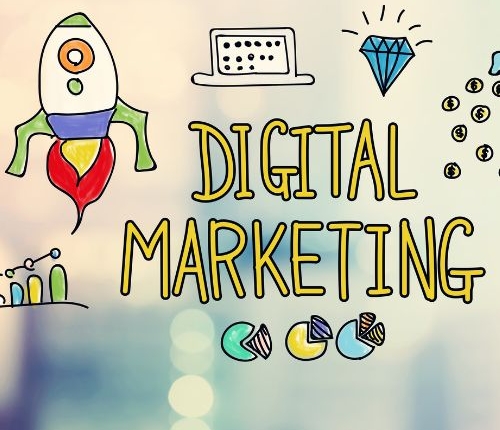Content Marketing vs Digital Marketing Strategies
Is Content Marketing or Digital Marketing the Better Choice for Your Business Growth?
In the dynamic world of modern marketing, two pivotal strategies emerge as game-changers: content marketing and digital marketing. While they often work hand in hand, understanding their distinct roles and how they complement each other is vital for any business aiming to excel in today’s digital landscape.
Content Marketing: The Art of Storytelling Content marketing is not just about creating content; it’s about crafting a narrative that resonates with your audience. This strategic approach focuses on producing and sharing valuable, relevant content to attract and retain a clearly defined audience, fostering a relationship that extends beyond mere transactions.
Digital Marketing: The Power of Online Channels Digital marketing, in contrast, is an all-encompassing term for marketing efforts that utilize digital tools and the internet. It’s about effectively using channels like search engines, social media, email, and websites to connect with both current and potential customers.
Synergy for Success Grasping the nuances and synergies between content marketing and digital marketing is not just theoretical; it’s a strategic necessity. By understanding how to leverage each approach effectively, businesses can develop a more integrated, impactful marketing plan that resonates with their audience and drives real results.
What is Content Marketing?
At its core, content marketing is about storytelling. It’s a strategic approach focused on creating and distributing valuable, relevant, and consistent content to attract and retain a clearly defined audience — and, ultimately, to drive profitable customer action.
The key components of content marketing include:
- Content Creation: This involves producing content that is valuable to your audience, whether it’s blog posts, videos, podcasts, infographics, or other formats.
- Content Distribution: Once the content is created, it needs to be shared through the right channels to reach your target audience effectively.
- Audience Engagement: Content marketing is not just about broadcasting information; it’s about engaging with your audience and building a relationship.
- Measurement and Analysis: Understanding how your content performs is crucial to refining your strategy and achieving better results over time.
Successful content marketing strategies often share a common thread: they’re customer-centric. For example, a company might use blog posts to answer common customer questions, or create instructional videos that help users get the most out of their products.
In summary, content marketing is not just about producing content; it’s about creating meaningful connections with your audience by providing them with value. It’s a long-term strategy that builds a strong foundation for customer loyalty and brand advocacy.

What is Digital Marketing?
Digital marketing, in its broadest sense, refers to any marketing effort that leverages online media and the internet through connected devices such as mobile phones, home computers, or the Internet of Things (IoT). Traditional channels such as television and print are not included in digital marketing, whereas platforms like social media, search engines, email, websites, and apps form its core.
The key components of digital marketing include:
- Search Engine Optimization (SEO): Enhancing online content so it ranks higher in search engine results pages for increased visibility.
- Pay-Per-Click Advertising (PPC): Paid online advertising where marketers pay a fee each time their ad is clicked.
- Social Media Marketing: Using platforms like Facebook, Instagram, and Twitter to reach an audience, build a brand, and drive traffic to a website.
- Email Marketing: Engaging with customers through email, often used for promotions, newsletters, and custom-tailored marketing messages.
- Content Marketing: As part of digital marketing, this involves creating and sharing valuable content to attract and convert prospects into customers.
- Affiliate Marketing: Earning a commission by promoting other people’s (or company’s) products.
- Influencer Marketing: Leveraging the reach of influencers in digital marketing to promote products.
Effective digital marketing campaigns are often characterized by their ability to leverage these components to achieve specific goals. For example, Dove’s “Real Beauty” campaign used a mix of content, social media, and video marketing to promote body positivity, resulting in significant brand engagement and loyalty.

Comparing Strategies: Content Marketing vs Digital Marketing
While content marketing is a subset of digital marketing, comparing them is like looking at pieces of a puzzle as part of the whole picture. Here’s how they differ and complement each other:
- Strategies and Tools:
- Content Marketing focuses on creating and distributing content to attract and engage a specific audience. Tools include blog posts, videos, podcasts, and social media content.
- Digital Marketing encompasses a broader range of strategies and tools, including SEO, PPC, email marketing, social media marketing, and more, aimed at reaching and engaging customers online.
- Goals:
- Content Marketing aims to build brand awareness, customer engagement, and loyalty. It’s a long-term strategy focused on building a strong relationship with the audience.
- Digital Marketing can have a variety of goals, including immediate sales, lead generation, brand awareness, or customer engagement, depending on the tactics used.
- Audience Engagement and Brand Building:
- Content Marketing is key in building a narrative for your brand and engaging with the audience on a deeper level. It’s about storytelling and creating a connection.
- Digital Marketing, while it can include content marketing, often focuses more on direct engagement strategies like ads, SEO, and email campaigns to drive specific actions.
- ROI (Return on Investment):
- Content Marketing can be challenging to measure in the short term but tends to have a high ROI over time as it builds a loyal customer base.
- Digital Marketing tactics like PPC can offer quicker, more easily measurable ROI but might not contribute as significantly to long-term brand loyalty.
In essence, while content marketing is about establishing a connection and engaging with your audience, digital marketing encompasses the broader tactics used to reach and interact with that audience online. Both are crucial and, when used together effectively, can create a powerful marketing strategy.
Integrating Content and Digital Marketing
The integration of content marketing and digital marketing strategies can create a synergistic effect, enhancing the impact of each. Here are some strategies for effectively combining the two:
- Use Content to Fuel Your Digital Marketing Channels: Your content marketing efforts can feed into your digital marketing channels. For example, blog posts can be promoted via social media, or a successful webinar can be repurposed into a series of email campaigns.
- Leverage Data from Digital Marketing to Inform Content Creation: Use insights from digital marketing campaigns to understand what content resonates with your audience. Analyzing data from PPC campaigns, social media engagement, and SEO performance can provide valuable insights into content preferences and trends.
- Consistent Brand Messaging Across All Platforms: Ensure that your content and digital marketing efforts present a consistent brand message. This consistency helps in building a recognizable brand identity across various digital touchpoints.
- Cross-Promotion Between Channels: Use different digital marketing channels to promote content. For instance, an infographic shared on social media can drive traffic to a detailed blog post on your website, enhancing both social media engagement and website traffic.
Case Studies of Successful Integration
- HubSpot: Known for its inbound marketing, HubSpot effectively integrates content marketing with digital marketing. They use valuable content to attract leads through search engines, social media, and email marketing, turning their website into a resource hub for their target audience.
- GoPro: GoPro combines engaging content with digital marketing by encouraging users to share their adventure videos shot on GoPro cameras. This user-generated content is then shared across digital platforms, creating a community and boosting brand visibility.
Choosing the Right Strategy for Your Business
When deciding between content marketing, digital marketing, or a blend of both, consider the following factors:
- Understand Your Audience: Knowing your audience’s preferences, online behavior, and content consumption habits is crucial. This understanding will guide whether to focus more on content, digital tactics, or a mix.
- Define Your Business Goals: Align your marketing strategy with your business objectives. If immediate sales are the goal, a digital marketing approach like PPC might be suitable. For long-term brand loyalty and customer engagement, content marketing could be more effective.
- Resource Allocation: Consider your resources in terms of budget, time, and expertise. Content marketing can be resource-intensive but offers long-term benefits. Digital marketing might require a different kind of investment, like budget for ads or tools for analytics.
- Measure and Adapt: Continuously measure the performance of your marketing efforts and be ready to adapt. Use metrics to understand what works and refine your strategy accordingly.
Tips for Aligning Marketing Strategy with Business Goals
- Set Clear KPIs: Define clear Key Performance Indicators (KPIs) for both content and digital marketing efforts. These should directly correlate with your business objectives.
- Leverage Analytics: Use analytics tools to track the performance of your marketing campaigns, understand customer behavior, and make data-driven decisions.
- Stay Flexible and Agile: Be prepared to pivot your strategy based on market trends, customer feedback, and performance data.

Future Trends in Content and Digital Marketing
As we look to the future, several emerging trends are set to shape the landscape of content and digital marketing:
- Increased Personalization and Customization: With advancements in AI and machine learning, expect to see even more personalized content and marketing messages, tailored to individual preferences and behaviors.
- Voice Search Optimization: As voice-activated devices continue to rise in popularity, optimizing content for voice search will become increasingly important in digital marketing strategies.
- Interactive and Immersive Content: The use of interactive elements in digital content, such as augmented reality (AR) and virtual reality (VR), is expected to grow, offering new ways to engage audiences.
- Video Content Dominance: Video content, particularly short-form videos, will continue to dominate social media and content marketing, driven by platforms like TikTok, Instagram Reels, and YouTube.
- Sustainability and Ethical Marketing: Consumers are increasingly favoring brands that demonstrate social responsibility and environmental sustainability. Content and digital marketing strategies will need to align with these values.
How Businesses Can Stay Ahead of the Curve
To stay ahead in the rapidly evolving world of content and digital marketing, businesses should:
- Embrace New Technologies: Keep abreast of new technologies and platforms and be ready to incorporate them into your marketing strategies.
- Focus on Data-Driven Decisions: Utilize analytics and data to understand audience behavior and preferences, and tailor your strategies accordingly.
- Invest in Continuous Learning: The digital landscape is always changing. Continuous learning and adaptation are key to staying relevant.
Conclusion
Throughout this exploration of content marketing and digital marketing, we’ve seen how each has its unique strengths and how, when integrated effectively, they can create a powerful marketing strategy.
From understanding the basics of each approach to examining the strategies for their integration, it’s clear that a well-rounded approach is essential in today’s digital world.
As we look to the future, staying abreast of emerging trends and continuously adapting our strategies will be crucial in staying relevant and effective in our marketing efforts. Whether it’s leveraging the latest technology, embracing the power of personalized content, or ensuring our strategies align with ethical and sustainable practices, the future of marketing is dynamic and exciting.
For businesses and marketers, the encouragement is clear: evaluate and adopt the right mix of content and digital marketing strategies. By doing so, you can build a strong, engaging, and future-proof marketing plan that not only reaches but resonates with your audience, driving your business towards its goals.
Ready to Elevate Your Marketing Strategy?
In the dynamic world of digital and content marketing, staying ahead isn’t just about keeping up with the trends; it’s about setting them. At MKTG Plan, we understand that each business has its unique story, audience, and goals. That’s why we don’t just offer cookie-cutter solutions; we create personalized marketing strategies that resonate with your brand and your audience.
Whether you’re looking to refine your content marketing approach, enhance your digital marketing tactics, or integrate both into a cohesive strategy, our team at MKTG Plan is here to guide you every step of the way.
We bring a blend of creativity, expertise, and data-driven insights to help your business not just meet its marketing goals, but exceed them.
Don’t let your business get lost in the digital noise. Let MKTG Plan help you stand out. Contact us today to start crafting a marketing strategy that truly reflects your brand’s voice and vision, and connects with your audience in meaningful ways.
Take the first step towards transforming your marketing strategy. Reach out to MKTG Plan now, and let’s create something remarkable together.



